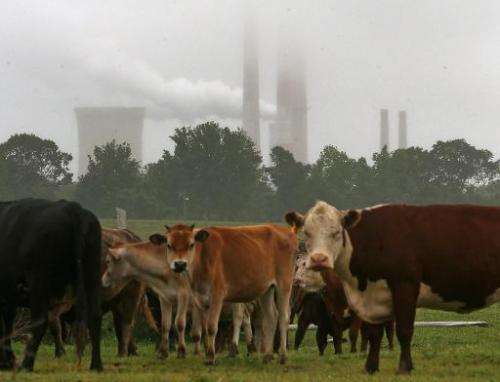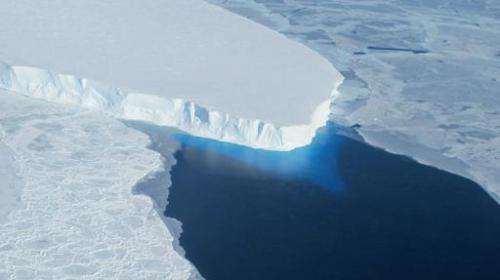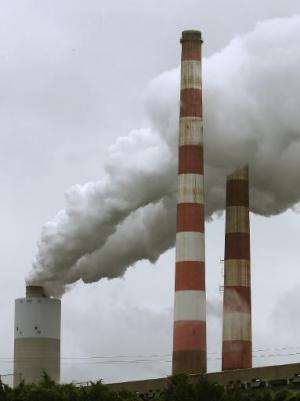Climate talks: EU steps up call for pre-2020 action (Update)

UN members launched a new round of climate talks Wednesday with Europe demanding early action to tame carbon emissions, two days after the United States unveiled a longer-term plan.
"Although we are already looking beyond the current decade, it is also crucial to step up action before 2020," the European Union's climate commissioner, Connie Hedegaard, said.
The EU is on track to reduce emissions of greenhouse gases in 2020 by about 24 percent over 1990 levels, more than its targeted cut of 20 percent, she said.
The "overachievement" amounts to a saving of some 5.5 billion tonnes of carbon overall.
"We are making a significant contribution to closing the 'ambition gap' between what the world needs to do and what countries intend to do by the end of this decade," Hedegaard said.
"We ask other major economies to come forward with concrete ways to step up their ambition."
The Bonn meeting—to be attended by several dozen ministers on Thursday and Friday—aims at clearing some roadblocks to a post-2020 global pact on carbon emissions, due to be sealed in Paris at the end of 2015.
The 12-day session under the UN Framework Convention on Climate Change (UNFCCC) is also supposed to ramp up pledges for tackling emissions before 2020.
In March, the UN's top scientific panel warned that action in the next few years may dictate whether the target of limiting warming to two degrees Celsius (3.6 degrees Fahrenheit) will be met easily and affordably, or at greater economic pain and human cost.
Key components of post-2020 and pre-2020 action are to be fleshed out in Lima in December, preceded in September by a special summit at the United Nations in New York hosted by Secretary General Ban Ki-moon.

On Monday, US President Barack Obama unveiled his most ambitious action yet on climate change.
He proposed ordering cuts of up to 30 percent in emissions from power plants by 2030 compared to levels in 2005, a benchmark far higher than that of Europe, which uses 1990.
'Entire planet at stake'
An analysis by specialists in Germany said Obama's plan, if implemented, would be a boost towards meeting pledges the US made in 2010, but would still leave it far short of the goal.
"While the proposal is welcome, it is insufficient to meet the US's pledges of 17 percent reduction of all greenhouse gas emissions by 2020 and is inconsistent with its long-term target of 83 percent below 2005 level by 2050," said Niklas Hoehne of Ecofys.
The new climate deal will have to deliver very deep cuts to meet the 2 C target, the analysis added—reaching zero greenhouse emissions somewhere between 2060 and 2080.
"For the energy and industry sectors, the deadline for reaching zero CO2 emissions should be faster, as early as 2045 and no later than 2065," it warned.
Although the UN community generally agrees on the risks from climate change, action to tackle the peril has sparked bitter fights.
Reducing carbon pollution carries an economic cost in energy efficiency and conversion to non-fossil sources, and countries are deeply divided over who should shoulder most of the bill.

The UN's Intergovernmental Panel on Climate Change (IPCC) warns that by 2100 the planet could be up to 4.8 C warmer and sea levels 26-82 centimetres (10-32 inches) higher.
Conflict, hunger, floods and mass displacement from coastal erosion could be the likely result, it says.
In Paris, meanwhile, religious leaders urged their followers to fight climate change by fasting or adopting "carbon-light" consumer practices—such as using a bicycle instead of a car—on the first day of every month until the December 2015 talks conclude.
The idea is to show support with victims of climate change and heap pressure on governments, they said at a press conference.
"The entire planet is at stake. The most fragile countries will be affected the most," said Monsignor Marc Stenger, representing the Conference of Bishops of France.
Climate fasting leapt into the headlines at the UNFCCC talks in Warsaw last November, when the Philippines' chief negotiator Yeb Sano decided to forgo food in an act of solidarity with victims of Typhoon Haiyan.
"We call on every person who cares about the future of our planet to join us and sing forth the message," Sano said at the press conference.
The "fast for climate" initiative is backed by the three main Christian faiths in France; the imam of the city of Bordeaux, Tareq Oubrou; Rabbi Gabriel Hagai; a Buddist monk, Matthieu Ricard, and 35 green groups in 21 countries.
© 2014 AFP





















